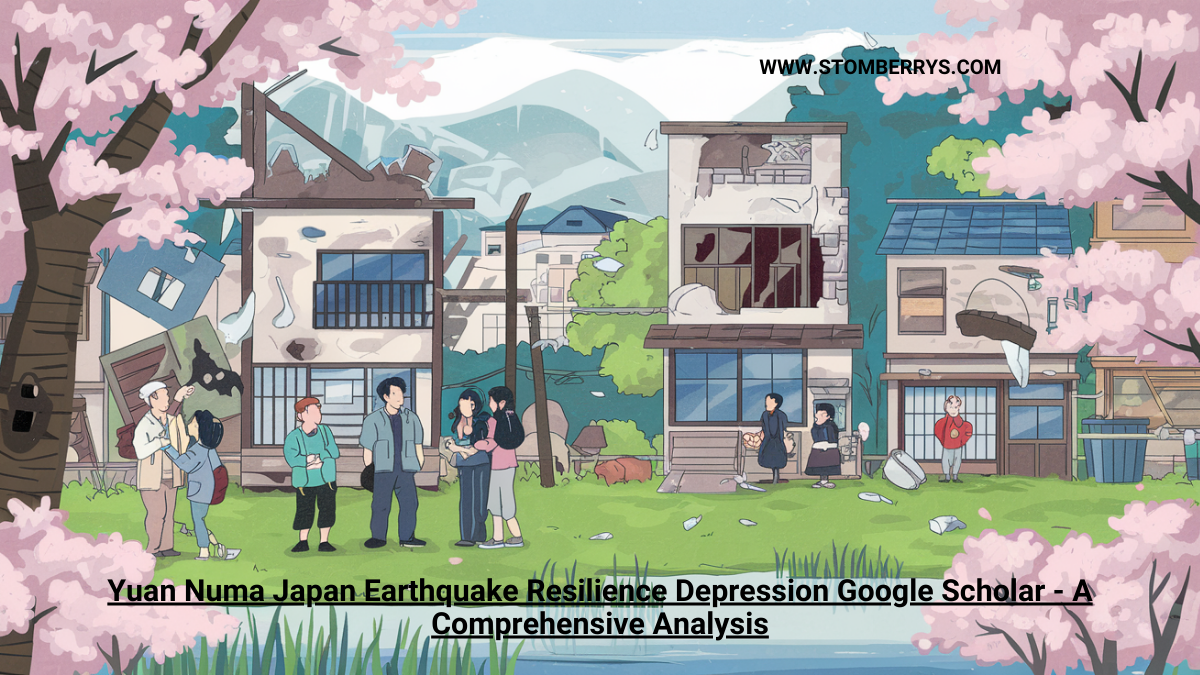Introduction: Understanding Japan’s Earthquake Resilience and Mental Health Challenges
Japan is renowned for its remarkable earthquake resilience, but what often goes unnoticed is the country’s concurrent battle with the mental health challenges that follow such disasters. Earthquakes not only devastate infrastructure but also profoundly impact people’s psychological well-being. One researcher who has delved deeply into this subject is Yuan Numa, whose work on Japan’s earthquake resilience, depression, and mental health recovery is extensively documented on Google Scholar.
Explore Yuan Numa’s research on Japan’s earthquake resilience, mental health, and depression recovery strategies, with a focus on building societal and psychological resilience post-disasters.
This article explores Yuan Numa’s research on Japan’s earthquake resilience and depression to provide insights into how individuals and societies can cope with the mental health challenges posed by such natural disasters. We will also touch on mental health recovery, resilience-building, and how this research can be useful for both Japan and other earthquake-prone countries.
The Importance of Earthquake Resilience in Japan
Earthquake Resilience: A Necessity for Survival
Japan is geographically situated on the Pacific Ring of Fire, where seismic activities are frequent and often severe. The country has invested heavily in infrastructure designed to withstand earthquakes, but there is an increasing awareness that earthquake resilience extends beyond buildings and roads—it must also include mental resilience.
Psychological Impact of Earthquakes
When disasters strike, the immediate focus is on physical survival. However, in the aftermath, psychological survival becomes equally important. Earthquakes, in particular, often lead to significant emotional and mental strain, including depression, anxiety, and PTSD.
Yuan Numa’s research, available on Google Scholar, highlights the long-term mental health impacts of Japan’s frequent earthquakes, especially focusing on how mental resilience plays a critical role in recovery.
Yuan Numa’s Research on Japan’s Earthquake Resilience and Depression
Who Is Yuan Numa?
Yuan Numa is a researcher who has focused on studying the impact of earthquakes on mental health in Japan, particularly how these events lead to depression and what can be done to foster resilience. Her work is readily accessible on Google Scholar and serves as a critical resource for understanding the deeper layers of earthquake recovery beyond just physical rebuilding.
Key Themes in Yuan Numa’s Research
- Mental Health in Disaster Recovery: Numa’s research emphasizes that mental health should be treated as a critical component of disaster recovery. Without addressing the psychological scars left by earthquakes, communities remain vulnerable to long-term social and economic setbacks.
- Depression as a Post-Earthquake Phenomenon: Numa identifies that depression is one of the most common mental health issues following large-scale earthquakes. The emotional toll of losing homes, loved ones, and a sense of security often triggers chronic depression, which can delay full recovery.
- Building Resilience: One of Numa’s core research points is the idea that building societal resilience can mitigate the psychological damage caused by earthquakes. Community support networks, government interventions, and even cultural practices can all contribute to a more resilient population.
Depression and Earthquake Recovery: The Hidden Crisis
Understanding Depression After Natural Disasters
Natural disasters like earthquakes are known to trigger a wide range of emotional responses, but depression is one of the most prevalent and long-lasting. Post-disaster depression can manifest in various forms, from chronic sadness and fatigue to more severe forms such as suicidal thoughts.
Yuan Numa’s research delves into the causes of post-earthquake depression, identifying key stressors such as:
- Loss of livelihood: Earthquakes can decimate businesses, leaving individuals without a source of income.
- Displacement: Being forced out of one’s home and into shelters or temporary housing can exacerbate feelings of insecurity and anxiety.
- Grief and Trauma: Losing loved ones or witnessing devastation can lead to unresolved grief, which often spirals into depression.
Mental Health Recovery Strategies
Numa’s work stresses that the recovery of mental health post-earthquake is not a linear process. She advocates for a multifaceted approach that includes:
- Psychological First Aid (PFA): Immediate mental health interventions can prevent the onset of depression.
- Long-term Therapy and Counseling: Mental health services should be available long after the physical recovery has been completed.
- Community-Based Support: Local communities can play a critical role in supporting individuals suffering from depression by creating environments of trust and solidarity.
Building Societal and Psychological Resilience: Insights from Yuan Numa’s Research
Societal Resilience: Strengthening Communities
In her work, Yuan Numa emphasizes the importance of societal resilience. She argues that recovery from earthquakes requires not just individual mental health strategies but also systemic efforts to create resilient communities. Her recommendations include:
- Community Engagement: By actively involving local communities in the disaster preparedness process, people feel more empowered to face challenges.
- Public Health Campaigns: Governments should initiate public health campaigns that focus on mental well-being as much as physical preparedness.
- Educational Programs: Schools and local organizations can educate citizens about mental resilience and coping strategies in the aftermath of earthquakes.
Personal Resilience: Individual Coping Mechanisms
Yuan Numa’s research also focuses on personal resilience, providing a roadmap for how individuals can mentally prepare for and recover from the psychological impacts of an earthquake. Key strategies include:
- Mindfulness and Stress Reduction: Techniques such as meditation and mindfulness can help manage anxiety and stress after a traumatic event.
- Social Connections: Maintaining strong social networks is critical in providing emotional support and reducing feelings of isolation.
- Professional Support: Seeking help from mental health professionals should be normalized and accessible to all affected individuals.
Google Scholar and Yuan Numa’s Contributions: Accessing Research for a Deeper Understanding
Google Scholar serves as a valuable resource for accessing Yuan Numa’s detailed studies on Japan’s earthquake resilience, depression, and recovery strategies. For anyone looking to explore her research further, Google Scholar offers a wealth of papers, studies, and resources. Key topics covered in her work include:
- The Role of Government in Mental Health Recovery
- Long-term Psychological Effects of Earthquakes
- Cultural Responses to Disaster in Japan
Her research has become a foundational resource for understanding how mental health can be integrated into broader earthquake preparedness and recovery efforts.
Lessons for Other Earthquake-Prone Regions: Applying Japan’s Experience
Japan’s experience with earthquakes and Yuan Numa’s findings can offer valuable lessons for other earthquake-prone regions, such as the USA’s West Coast, parts of South America, and South Asia. By focusing on building both physical and psychological resilience, countries can improve their overall recovery outcomes.
Adopting Resilience Models
- Mental Health Integration: Earthquake preparedness plans should include a mental health component, similar to how Japan is beginning to integrate such strategies based on Numa’s research.
- Community Resilience Initiatives: Fostering strong community bonds before a disaster can accelerate both physical and emotional recovery afterward.
- Policy Development: Governments should enact policies that address the long-term mental health effects of disasters, making psychological support systems a part of emergency management.
FAQs
1. Who is Yuan Numa?
Answer: Yuan Numa is a researcher focused on Japan’s earthquake resilience and mental health recovery, especially addressing depression in post-earthquake settings.
2. What is the focus of Yuan Numa’s research?
Answer: Numa’s research focuses on the mental health impacts of earthquakes, particularly how societies and individuals can build resilience against depression and trauma.
3. How can Japan’s resilience model help other countries?
Answer: Japan’s strategies, including community-based support and mental health initiatives, can serve as models for other earthquake-prone countries aiming to improve disaster recovery.
4. How does Google Scholar help in accessing Yuan Numa’s research?
Answer: Google Scholar provides access to Yuan Numa’s published work on earthquake resilience, making it easier for researchers, policymakers, and the public to find in-depth studies.
5. What are the long-term effects of earthquakes on mental health?
Answer: Long-term effects include depression, anxiety, PTSD, and other mental health issues that can persist for years if not adequately addressed.
Conclusion: A Path Forward
Yuan Numa’s research on Japan’s earthquake resilience, depression, and mental health recovery provides critical insights into how societies can better cope with the aftermath of natural disasters. By focusing on both individual and community resilience, Japan has created a model that not only helps rebuild infrastructure but also addresses the often-overlooked psychological toll of earthquakes. Countries around the world can benefit from these strategies, ensuring that both physical and mental health are integral parts of their disaster preparedness and recovery plans.





